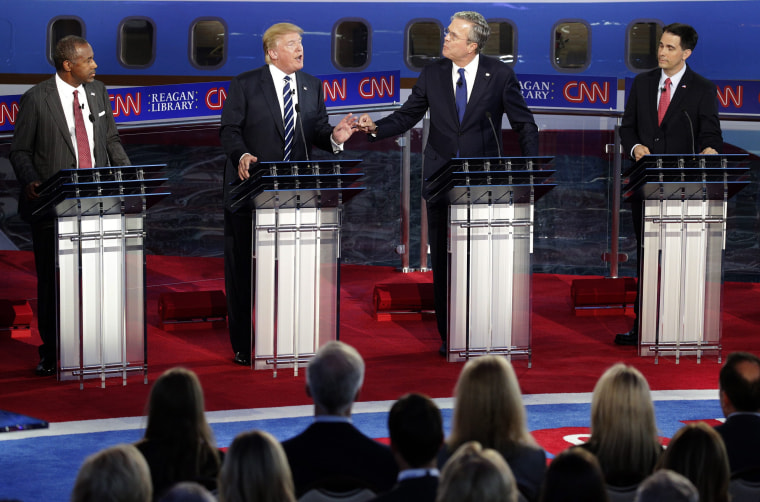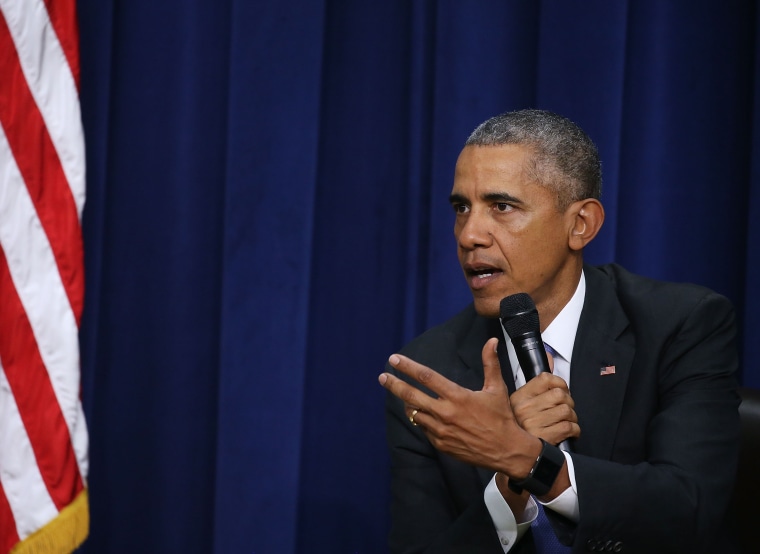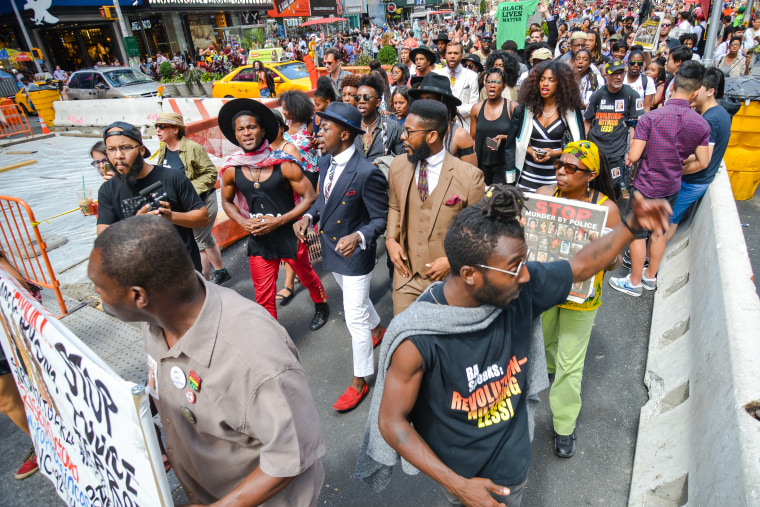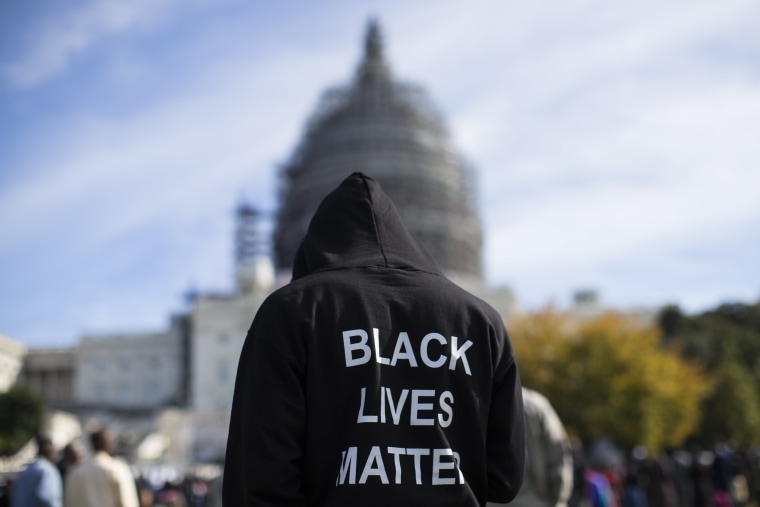
Black Lives Matter activists are continuing their push for platform and policy on the 2016 presidential campaign agenda.
But while the BLM movement is positioning itself to be one of the biggest game changers in the electoral cycle, the Democratic National Committee and Republican National Committee will still stick to their formal debate schedule.
Both parties responded to the call for a BLM debate last week. The DNC says they will not add a debate, but are open to having a town hall. The RNC says they do not support or oppose a town hall, but they will assist those planning them in understanding the rules.
Deray McKesson, Campaign Zero activist who is working with party officials to coordinate presidential town halls, told MSNBC’s Melissa Harris-Perry Sunday that a town hall forum would be truer to the movement.
“[The town hall] is a form that has real people asking real questions and we have a unique opportunity to do that,” McKesson said on MHP. “A debate — while it is an interesting format — is heavily moderator led.”
Alicia Garza, co-creator of #BlackLivesMatter, on the other hand says having a formal debate forces the DNC to do the work of organizing around these issues.
“It’s less a question of the format to us,” Garza told MHP. “We want to make sure that the Democratic National Committee is having serious conversions at every single level about how to address the crisis facing black communities today. And what we think that does not mean is resting it on the shoulders of black folks to do that work for them.”
Though some members of the BLM Network were surprised and appreciative of the prompt response, this week the call for a debate still stands.
“We’re asking for a debate that the candidates themselves can speak directly and proactively to the issues impacting black people around the country,” Carmen Dixon, an organizer with the BLM New York City Chapter, told NBCBLK. “As a network, we and our partners are already planning to host issues forums and the town halls that Deray was referring to.”
For Dixon and other local BLM activists, the debate is an opportunity for the candidates to break tradition and be forward thinking in their approach to addressing the crises facing communities of color.
Dixon says a BLM presidential debate is an effort to push beyond the rhetoric to address the root of policies that disenfranchise people of color.
“We had discussions with some of the candidates already and if they can’t come up with their own set of plans to end oppression that happens from some of the policies that they actually created, then we’re in trouble,” Dixon said.
As the race intensifies, the Democrats and Republicans have their work cut out for them to gain the support of black voters. In the last presidential election, federal data shows the black voting rate surpassing the white voting rate by a small margin — a margin that is growing. With these statistics, both the GOP and Democrats have no choice but to listen.
Independent of the 2016 presidential race, BLM is garnering the public support of President Obama. Six days ago, Obama — in his strongest stance yet of the movement — said the nation needed to address these issues.
"I think the reason that the organizers used the phrase 'Black Lives Matter' was not because they were suggesting nobody else's lives matter,” the President told Bill Keller of The Marshall Project. “Rather, what they were suggesting was there is a specific problem that's happening in the African-American community that's not happening in other communities. And that is a legitimate issue that we've got to address."

Chelsi Henry, attorney, 2020 Club member and contributor to EBONY.com, says the GOP is listening and is responding to some of the issues within the BLM movement, particularly in areas of criminal justice reform.
Henry, a young conservative voter of color, says she grew up in the urban core of Jacksonville and noticed the unfair patterns of prison sentencing.
“I saw how one mistake can be a life sentence for someone, how two mistakes can be a life sentence for someone,” Henry said.
With this personal experience, Henry says she pushes harder for criminal justice reform within the GOP party. Henry says some folks may not believe it or want to see it, but the GOP is working on addressing these concerns.
“The GOP gets it and they’re working on it,” Henry said. “We are not on the sidelines, we are in the game, and I hope that as we’re bouncing the ball down the court, more people will realize we’re putting the ball in the basket.”
Meanwhile, GOP Frontrunners Donald Trump and Ben Carson have spoken out against the movement.
During an appearance earlier last month on Fox News’ “The O’Reilly Factor,” Trump said of the movement: “they’re trouble, I think they’re looking for trouble,” adding “it’s disgraceful the way that they’re being catered to by Democrats,” while emphasizing “all lives matter.
Ben Carson followed suit, even criticizing President Obama last month for talking about race too much.
"We've actually regressed with this administration and its emphasis on race, because it emphasizes race to indicate that things are not progressing well. And that just isn't true," Carson told the AP. “A lot of people perceive everything through racial eyes. But my point is, we don't have to do that. What we have to do instead is begin to see people as people."

The GOP is in the spotlight this week for the debate, as the Democrats are gearing up to have their debate on Nov. 14 in Iowa.
But will BLM activists tune in to tonight’s GOP Debate? Some local activists say: not likely.
“I’ll probably catch soundbites later. It’s not a priority for me,” Melina Abdullah, a local activist in the BLM Los Angeles chapter, said. “The major Republican contenders have been very clear where they stand on our issues so to pretend like they’re going to speak to us is a huge stretch. I mean it would have to be like a science fiction novel. The turnaround would have to be some supernatural turnaround.”
Whether before or long after the debates have concluded, BLM activists emphasize that the movement’s push for equality will continue.
“While we’re calling for this Democratic debate around black lives matter, black lives matter is not abandoning our outside strategy,” Abdullah said. “It is a recognition that electoral politics play a part in our lives and a recognition that we have to elevate our issues to the candidates. That said, we are in no way signaling that we are not going to continue the grassroots work. Our primary work occurs in the streets.”
The CNBC GOP Debate airs Wednesday night at 8pm EST hosted by CNBC’s Carl Quintanilla, Becky Quick, and John Harwood including CNBC correspondent Sharon Epperson who will serve as a debate panelist.

